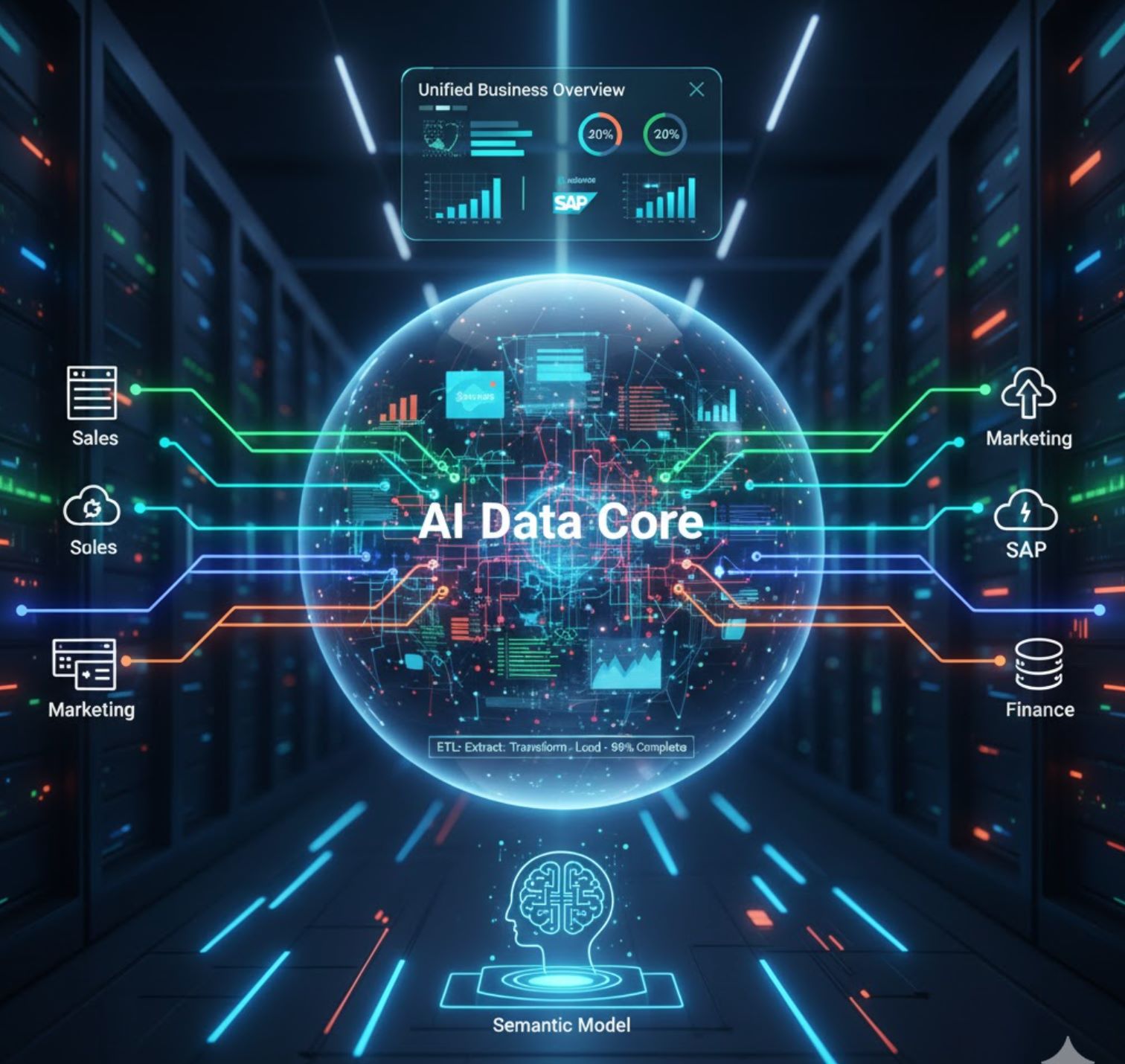AIを活用した迅速なレポート作成のコツ
ChatGPT、Microsoft Copilot、Power BIなどのAIツールを使えば、数分でプロフェッショナルなレポートを作成できます。データの一元管理、ビジュアルの自動生成、AIによる要約、レポート作成ワークフローの自動化などの専門的なコツを学び、時間を節約しながら精度と協力体制を向上させましょう。
AI搭載ツールは、データ分析とレポート作成を自動化することで、数日かかっていた作業を数分に短縮できます。最新のBIプラットフォームは、生データを取り込み、パターンを検出し、ほぼ瞬時にチャートやテキストを生成します。これらの機能を活用することで、チームや関係者向けのレポート作成を加速できます。以下に、迅速かつ信頼性の高いレポート作成のための実践的なヒントを紹介します。
AIでデータを一元管理・準備する
まず、関連するすべてのデータを一か所に集めましょう。IBM CognosやDomoなどの先進的なAI搭載分析プラットフォームは、複数のデータソースを統合ビューで接続できます。例えば、Cognosは「既存のツールと連携し、すべてのデータを単一の統合ダッシュボードにまとめます」。
既存のツールと連携し、すべてのデータを単一の統合ダッシュボードにまとめます。
— IBM Cognos Analytics
これにより、スプレッドシートやデータベースの手動での面倒な統合作業が不要になります。データが一元化されることで、AIはより高速に処理できます。プラットフォームのAI「エージェント」は、販売、マーケティング、財務などの複雑なデータセットを分析し、重要な発見を自動的に抽出します。

ビジュアルとインサイトを自動生成する
次に、組み込みのAIレポート機能を使ってチャートや説明文を自動作成しましょう。Microsoft Power BIのクイックレポートやIBM CognosのAIアシスタントなどのツールは、データをスキャンして数秒でビジュアルを提案します。
Power BI クイックレポート
データセットを読み込むか貼り付けると、初期チャートとともに要約ビューを自動生成します。
- 即時のビジュアル生成
- フィールド変更に自動更新
- 手動でのチャート設定不要
IBM Cognos AIアシスタント
自然言語で質問すると、即座にチャート提案や予測を得られます。
- 自然言語クエリ
- インテリジェントなチャート推奨
- 自動予測機能

スケジュールとテンプレートを自動化する
データとビジュアルが整ったら、ルーチン作業を自動化しましょう。レポートテンプレートを定義し、自動実行のスケジュールを設定します。Narrative BIのレポートでは、自動レポート生成が「レポート作成プロセスを高速化」し、「エラーリスクを減らし時間を節約」します。
テンプレート作成
レポート構造(指標、フィルター、レイアウト)を再利用可能なテンプレートとして保存し、一貫性を保ちます。
スケジュール設定
BIツールに定期的(毎日、毎週、毎月)にレポートを更新・配信するよう設定します。
自動配信
関係者は手動操作なしで最新レポートを受け取れます。
事前定義されたフォーマットは、レポート作成時間を短縮し、すべての成果物で視覚的一貫性を提供します。
— Narrative BI

AIで内容を要約・簡素化する
AIを使って情報を抽出し、明確な説明文を作成しましょう。大規模言語モデルは、データの要約や凝縮に優れています。例えば、レポートに長文の分析や会議記録が含まれる場合、AIが簡潔な要約を生成できます。
AIによる要約は、長大なレポートやマニュアルを要点を押さえた短いまとめに置き換えます。
— AI要約エキスパート
入力データ
AI処理
洗練された出力

協力と検証を行う
最後に、最新のクラウドプラットフォームを活用してチームで協力しつつ、AIの出力は必ず検証しましょう。クラウドベースのBIツールはリアルタイムでの共同作業を可能にし、複数の同僚が同時にレポートを閲覧・編集・コメントでき、バージョン混乱を防ぎます。
AIが担当する作業
- データの取り込みと処理
- チャートやビジュアルの生成
- パターン認識
- コンテンツの要約
- テンプレートの適用
人間が検証する内容
- 数値や計算の正確性
- 前提条件の妥当性
- チャートのラベルの正確さ
- 文脈に合った内容かどうか
- 最終的な品質保証

重要ポイントまとめ
- データを接続・クリーンアップ:AI搭載BIツールでソースを一元化し、準備時間を節約(IBM Cognosの連携例参照)。
- AIレポートウィザードを活用:Power BIのクイックレポート機能などでフィールドからチャートを自動生成。
- 自然言語で質問:AIアシスタントに質問を入力(例:「前四半期の売上傾向を見せて?」)し、即座にビジュアルを取得。
- テンプレートで自動化:レポートテンプレートを保存し、更新・配信をスケジュール設定して自動化。
- 内容を要約:AI要約を使い、長い分析を短いインサイトに変換。
- レビューと協力:クラウドプラットフォームでリアルタイムに共同作業し、AIの出力は必ず人間が検証。
レポート作成におすすめのAIツール
ChatGPT
ChatGPTはOpenAIが開発した生成型AIアプリケーションで、自然言語のプロンプトを通じて構造化されたレポートを含むプロフェッショナルな文書を迅速に作成できます。「Xのトピックに関するレポートを作成して」と依頼するだけで、見出しや分析、説明を含むドラフト文書を数分で受け取れ、ウェブやモバイルで利用可能です。複数言語、複数モデルに対応し、無料プランと有料プランの両方を提供しています。
Microsoft Copilot
Microsoft 365 Copilot(一般に「Copilot」とも呼ばれます)は、Microsoftが提供するAI強化ツールで、Microsoft 365アプリ全体でコンテンツの生成、データ分析、プロフェッショナルなスタイルのレポート作成を支援します。Word、Excel、PowerPoint、Teamsなどのアプリケーションと連携し、組織のデータ、大規模言語モデル、コンテキストインテリジェンスを活用して、ドキュメント作成、データ洞察、ワークフロータスクの自動化を実現します。
Power BI
Microsoft Power BIは、Microsoftが開発したビジネスインテリジェンスおよびレポーティングプラットフォームであり、組織が多様なデータソースに接続し、そのデータを変換・モデリングして、インタラクティブなビジュアル、ダッシュボード、レポートを生成し、実用的な洞察を引き出すことを可能にします。自然言語によるQ&AやスマートナラティブなどのAI機能をサポートし、Power BIはレポート作成とデータストーリーテリングを加速します。
Storydoc
Storydocは、標準的なドキュメント、スライド、レポートをインタラクティブで視覚的に魅力的なストーリーに変換する、生成AIを活用したウェブベースのプラットフォームです。Storydocを使えば、プロンプト、PDF、ウェブサイトのリンクを入力するだけで、プロフェッショナルなレポート、ピッチデッキ、インパクトストーリーを迅速に作成でき、システムが自動的にレイアウト、ビジュアル、テキスト、ブランドスタイリングを生成します。また、トラッキングや分析機能も備えており、リアルタイムで閲覧者のエンゲージメントを監視できます。
これらのヒントを活用すれば、AIを使って通常の時間のごく一部で洗練された最新レポートを作成できます。適切なAIツールと明確な指示、そして監督を組み合わせることで、レポート作成のワークフローが効率化され、データ処理の手間から解放されてインサイトに集中できます。







No comments yet. Be the first to comment!